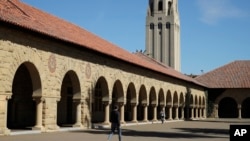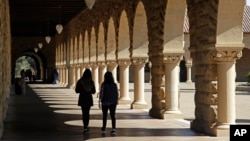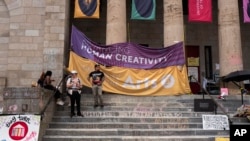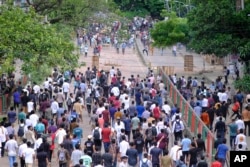Student Union
If It’s 3:30 a.m., It Must Be Time for Online Class

It’s 3:30 a.m. It’s almost time for class.
I take a moment to stare into my pitch-black room. I always set my alarm 30 minutes before class starts so I don’t oversleep. Sometimes I hit the snooze button to get an extra 10 minutes of rest.
After a few minutes, I get up and slowly open my door. I tiptoe to the kitchen to get a glass of water, careful not to wake my sleeping family members.
As I click the link into the Zoom classroom, my professor greets everyone with a “Good afternoon.” It’s 2 p.m. in Virginia, but 4 a.m. in South Korea. Some of my classmates sip on their afternoon coffee on their patio before class begins.
I wish I had coffee.
When the first couple of cases were reported in the United States in January, South Korea was the second most infected country in the world with around 10,000 cases. I was more worried about my family back home.
They would update me regularly about the strict coronavirus guidelines and how the government passed a mask mandate where people could only purchase two N-95 face masks per week.
When they asked how I was doing, I reassured them that I was fine and that there were only a few cases. This was in February.
But as cases began to climb at a frightening speed in early March, my parents and I decided it would be best to be with family during this bizarre time.
I was one of the thousands of international students who returned to their home countries that month due to the coronavirus pandemic.
I knew that this meant I’d have to take courses during the middle of the night and become a master of time zones. Online courses are definitely not the most ideal way to absorb information, but because I was so close to graduating, I decided to finish my degree online in South Korea.
This semester, my synchronous classes started at 3 a.m., 11 p.m., and 10 p.m. Then Daylight Saving Time pushed time an hour back. Needless to say, I don’t really have a set sleep schedule at this point.
But like most people around the world, this year was all about adjusting and becoming flexible with one’s schedule and surroundings, so I told myself this was an adjustment I’d have to make.
“Zoom University,” a term frequently used to describe online classes, has left college students around the world dissatisfied and anxious.
“Six hours in school is better than three hours in online classes,” tweeted Muhd Akif Bin Azmi, a student attending Form Six college in Petaling Jaya, Malaysia. His tweet struck a chord with thousands of people, garnering more than 99,000 likes and nearly 31,000 retweets.
In a report surveying 290 university students in South Korea, 56% said they were planning to take a leave of absence for the 2020 fall semester with low satisfaction for online courses being the top reason. The main complaint? “I would rather take a leave of absence than take a class that only reads Powerpoint.”
New enrollment of international students dropped 43% because of COVID-19 in the academic school year that began four months ago, according to the Institute of International Education. Nearly 40,000 students — mostly incoming freshmen — have deferred enrollment at 90% of U.S. institutions.
Many students struggled at the beginning of the year with the abrupt shift to virtual learning, prompting universities to switch to pass/fail grading options or cut back on tuition. Some universities extended pass/fail grading options for the fall semester as the coronavirus continued to spread at alarming rates.
Despite setbacks, I’m grateful for the position I am in and understand it is a privilege to be able to continue my education online.
Millions of other students have been derailed from their studies because the coronavirus pandemic has created a global education emergency. As of December 1, more than 224 million students have been affected by school closures, according to the United Nations Educational, Scientific, and Cultural Organization (UNESCO).
For children, the number is even higher. More than 1 billion children are out of school because of closures across 188 countries, according to the United Nations Children’s Fund (UNICEF).
Students are not the only ones struggling with online classes. Parents, teachers and university professors have expressed their frustrations and concerns with online learning.
In the end, 2020 has proven to be one of the strangest and most devastating times for millions around the world. We’ve all had to sacrifice, adjust, adapt and heal in our own ways.
On the bright side, I’ve learned to work under tough conditions and deliver and become a flexible, strategic thinker.
And as my college journey comes to an end, I do think that this has been a character-building experience and I know I’m going to exit this situation better than when I came into it.
I have my graduation ceremony to look forward to! It will be virtual.
At 4 AM KST.
See all News Updates of the Day
Tips for first-year international students in the US

Book your flights right away, get a U.S. phone plan, make sure you have linens for your dorm and attend orientation – that’s some of the advice international students have for first-year college students coming from abroad.
U.S. News & World Report compiled helpful tips for students studying in the United States for the first time. (July 2024)
Survey: Social integration, career prep are important to international students

A recent survey of international students in the United States found that before starting school, they were concerned about personal safety, making friends and feeling homesick.
Inside Higher Ed reports that international students want specialized orientations, peer connections, career preparation and job placement to help make their college experiences successful. (July 2024)
US advisory council ends Nigeria visit, signs student exchange deal

Members of a U.S. presidential advisory council have approved a student exchange deal between an American college and a Nigerian university as part of the council's effort to strengthen collaboration on education, health, entrepreneurship and development between Africa and Africans living abroad.
The council also visited a health facility supported by the United States Agency for International Development in the capital.
Nigerian authorities and visitors chatted with members of the U.S President's Advisory Council on African Diaspora Engagement as they toured a healthcare facility in Karu, a suburb of Abuja, on the last day of the council's three-day visit to Abuja and Lagos.
The facility is one of many supported by the United States Agency for International Development, or USAID, to improve the management of childhood illnesses, family planning, immunization and delivery.
The tour was part of the council's effort to promote African diaspora-led investments in technology entrepreneurship, education and healthcare delivery.
"They're doing a phenomenal job there, it really gave us a sense of what the healthcare system is in Nigeria," said Deniece Laurent-Mantey, executive director of the advisory council. "This is our first trip as a council to the continent and we chose Nigeria for a reason — the diaspora in Nigeria is very active, very influential, and they're really a source of strength when it comes to our U.S.-Africa policy. And so for us coming to Nigeria was very intentional."
The council was created by President Joe Biden in September to improve collaboration between Africa and its diaspora in terms of economic and social development.
Akila Udoji, manager of the Primary Healthcare Centre of Karu, said officials in Nigeria were pleased that the council members were able to visit.
"We're happy that they have seen what the money they have given to us to work with has been used to do, because they have been able to assist us in capacity-building, trainings, equipment supply and the makeover of the facility," Udoji said.
Earlier, the council signed a deal for a student exchange program between Spelman College in the southern U.S. city of Atlanta and Nigeria's University of Lagos.
Laurent-Mantey said education exchanges are one of the council's top priorities.
"In Lagos, we had the president of Spelman College — she's also a member of our council — she signed an agreement with the University of Lagos to further education exchange programs in STEM and creative industries between those two universities," Laurent-Mantey said. "And I think for us it's very important, because Spelman College is a historically Black university, and so here we are promoting the importance of collaboration between African Americans and Africans."
In March, the advisory council adopted its first set of recommendations for the U.S. president, including the student exchange initiative, advocating for more U.S. government support for Africa, climate-focused initiatives, and improving U.S. visa access for Africans.
The council met with Nigerian health and foreign affairs officials during the visit before leaving the country on Wednesday.
American Academy of the Arts College announces closure

The American Academy of Art College in Chicago announced it would be closing after 101 years of preparing students for careers in art and illustration.
WTTW news reported that like other art colleges, the academy saw enrollment drop after the pandemic, and officials made the decision to close the college last month. (July 2024)
5 killed, dozens injured in clashes over Bangladesh jobs quota system

At least 5 people were killed and dozens injured in two separate incidents in Bangladesh as violence continued Tuesday on university campuses in the nation's capital and elsewhere over a government jobs quota system, local media reports said quoting officials.
At least three of the dead were students and one was a pedestrian, the media reports said. Another man who died in Dhaka remained unidentified.
The deaths were reported Tuesday after overnight violence at a public university near Bangladesh's capital, Dhaka. The violence involved members of a pro-government student body and other students, when police fired tear gas and charged the protesters with batons during the clashes, which spread at Jahangir Nagar University in Savar, outside Dhaka, according to students and authorities.
Protesters have been demanding an end to a quota reserved for family members of veterans who fought in Bangladesh's war of independence in 1971, which allows them to take up 30% of governmental jobs.
They argue that quota appointments are discriminatory and should be merit-based. Some said the current system benefits groups supporting Prime Minister Sheikh Hasina. Some Cabinet ministers criticized the protesters, saying they played on students' emotions.
The Bengali-language Prothom Alo daily newspaper reported that one person died in Dhaka and three others, including a pedestrian, were killed after they suffered injuries during violence in Chattogram, a southeastern district, on Tuesday.
Prothom Alo and other media reports also said that a 22-year-old protester died in the northern district of Rangpur.
Details of the casualties could not be confirmed immediately.
While job opportunities have expanded in Bangladesh's private sector, many find government jobs stable and lucrative. Each year, some 3,000 such jobs open up to nearly 400,000 graduates.
Hasina said Tuesday that war veterans — commonly known as "freedom fighters" — should receive the highest respect for their sacrifice in 1971 regardless of their current political ideologies.
"Abandoning the dream of their own life, leaving behind their families, parents and everything, they joined the war with whatever they had," she said during an event at her office in Dhaka.
Protesters gathered in front of the university's official residence of the vice chancellor early Tuesday when violence broke out. Demonstrators accused the Bangladesh Chhatra League, a student wing of Hasina's ruling Awami League party, of attacking their "peaceful protests." According to local media reports, police and the ruling party-backed student wing attacked the protesters.
But Abdullahil Kafi, a senior police official, told the country's leading English-language newspaper Daily Star that they fired tear gas and "blank rounds" as protesters attacked the police. He said up to 15 police officers were injured.
More than 50 people were treated at Enam Medical College Hospital near Jahangir Nagar University as the violence continued for hours, said Ali Bin Solaiman, a medical officer of the hospital. He said at least 30 of them suffered pellet wounds.
On Monday, violence also spread at Dhaka University, the country's leading public university, as clashes gripped the campus in the capital. More than 100 students were injured in the clashes, police said.
On Tuesday, protesters blocked railways and some highways across the country, and in Dhaka, they halted traffic in many areas as they vowed to continue demonstrating until the demands were met.
Local media said police forces were spread across the capital to safeguard the peace.
Swapon, a protester and student at Dhaka University who gave only his first name, said they want the "rational reformation of the quota scheme." He said that after studying for six years, if he can't find a job, "it will cause me and my family to suffer."
Protesters say they are apolitical, but leaders of the ruling parties accused the opposition of using the demonstrations for political gains.
A ruling party-backed student activist, who refused to give his name, told The Associated Press that the protesters with the help of "goons" of the opposition's Bangladesh Nationalist Party and Jamaat-e-Islami party vandalized their rooms at the student dormitories near the Curzon Hall of Dhaka University.
The family-of-the-veterans quota system was halted following a court order after mass student protests in 2018. But last month, Bangladesh's High Court nulled the decision to reinstate the system once more, angering scores of students and triggering protests.
Last week, the Supreme Court suspended the High Court's order for four weeks and the chief justice asked protesting students to return to their classes, saying the court would issue a decision in four weeks.
However, the protests have continued daily, halting traffic in Dhaka.
The quota system also reserves government jobs for women, disabled people and ethnic minority groups, but students have protested against only the veterans system.
Hasina maintained power in an election in January that was again boycotted by the country's main opposition party and its allies due to Hasina's refusal to step down and hand over power to a caretaker government to oversee the election.
Her party favors keeping the quota for the families of the 1971 war heroes after her Awami League party, under the leadership of her father, Sheikh Mujibur Rahman, led the independence war with the help of India. Rahman was assassinated along with most of his family members in a military coup in 1975.








